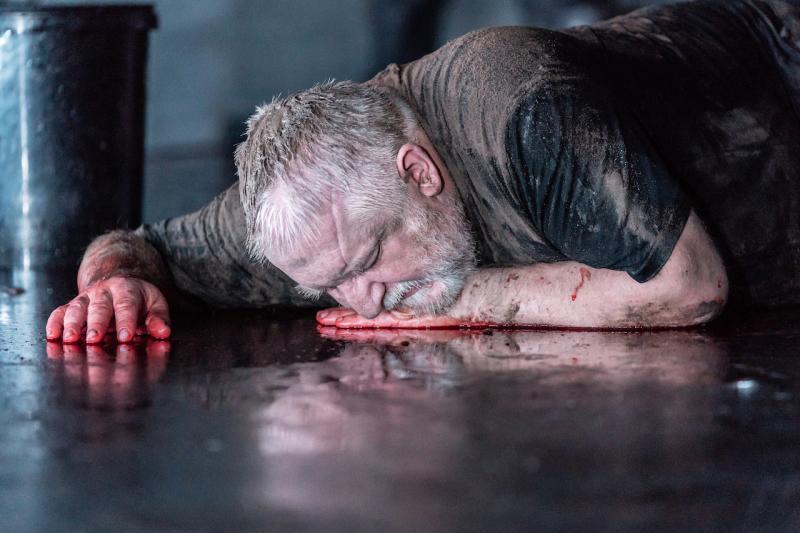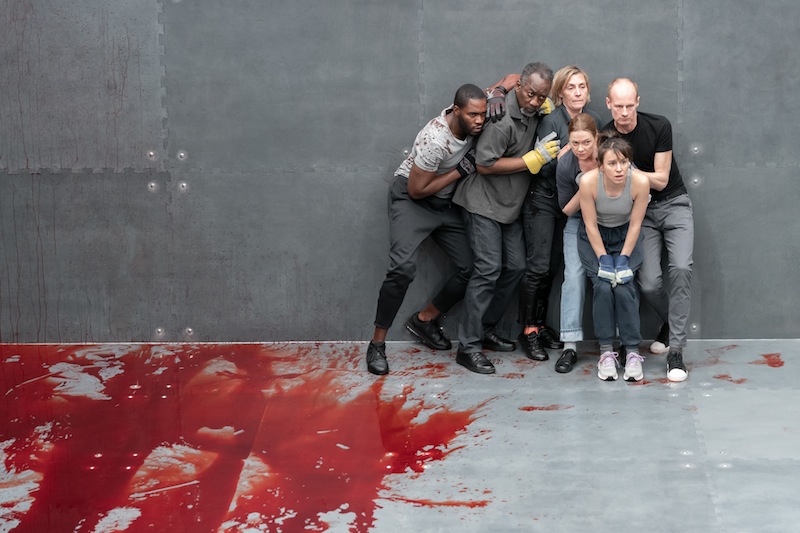The Tragedy of King Richard II, Almeida Theatre review - Simon Russell Beale leads revelatory interpretation | reviews, news & interviews
The Tragedy of King Richard II, Almeida Theatre review - Simon Russell Beale leads revelatory interpretation
The Tragedy of King Richard II, Almeida Theatre review - Simon Russell Beale leads revelatory interpretation
Shakespeare's study of flawed leadership becomes a parable for our age

Joe Hill-Gibbins’ uncompromising production of The Tragedy of Richard II hurtles through Shakespeare’s original text, stripping and flaying it so it is revealed in a new shuddering light.
Under Rupert Goold’s artistic directorship the Almeida has become renowned as a theatre where classical texts are given the equivalent of ECT, and Hill-Gibbins quickly sets out his intentions by beginning the play at the end. "I have been studying how I may compare/This prison where I live unto the world," declares Richard, staring out from a stark cell in which the other players stand with their faces to the wall, mutely subservient.
The next moment we’re in flashback – the light changes, the jeans-and-t-shirt-clad cast are moving around the stage, and Richard is adjudicating the argument between Mowbray and Bolingbroke that will eventually spiral into rebellion against his reign. Against Ultz’s industrial container-like set – lined with buckets variously labelled as containing "blood", "soil" and "water" – Russell-Beale’s Richard sets out his passive-aggressive stall, clearly enjoying the men’s animosity towards each other at the same time as he capitalises on it.
In a time convulsed alternately by the absurdities of Brexit, and the mercurial toddlerish impulses of the US President, it’s difficult not to recognise the degree to which Shakespeare’s analysis of flawed, indecisive leadership is a parable for our age. It’s a strength of the production that it simply allows this to sing through the words: there are no hat-tips to Trump, no break-out Rees-Mogg moments. Yet against the harsh, minimalistic aesthetic we are left in no doubt of the black comedy of individuals groping for power only to destroy themselves and one another. Intending to be predators, they reveal themselves as selfish children – you suspect there won’t be many Old Etonian politicians selecting this for a work outing. Yet it would be foolish for them – or anybody else – to miss it, for this is a revelatory interpretation, marked by an intense and galvanising physicality. In counterpoint to Richard, the rest of the players are almost like a chorus (pictured above), often comically huddled together against a wall, playing multiple roles so they are characterised mainly by their rebellious aggression. Brilliant though the edit of the script is (it’s boiled down to one hour and 40 minutes), there are points when you could almost review this as a piece of avant-garde choreography. Russell Beale particularly is a master of subverting the body language of power – often, when he takes on an opponent he conveys the moment of dominance not by standing over them, but kneeling down and whispering hostile intimacies.
Yet it would be foolish for them – or anybody else – to miss it, for this is a revelatory interpretation, marked by an intense and galvanising physicality. In counterpoint to Richard, the rest of the players are almost like a chorus (pictured above), often comically huddled together against a wall, playing multiple roles so they are characterised mainly by their rebellious aggression. Brilliant though the edit of the script is (it’s boiled down to one hour and 40 minutes), there are points when you could almost review this as a piece of avant-garde choreography. Russell Beale particularly is a master of subverting the body language of power – often, when he takes on an opponent he conveys the moment of dominance not by standing over them, but kneeling down and whispering hostile intimacies.
Yet as ever, it is his skill in excavating every nuance of the words he delivers that makes this evening what it is. One of the most extraordinary moments is when he delivers the famous speech in which Richard II surveys himself in a mirror after his downfall.
In this production there is nothing as fey as a looking glass to hand: it is a bucket of water – no more dignified than a slop pail – into which he stares, while on his knees. "No deeper wrinkles yet?" he proclaims, allowing all the pathos and vanity of his words to resonate. Then, in a moment of brilliance, he sits up and delivers the rest of the mirror speech to his former subjects. In that subtle linking of speech and movement he powerfully conveys how he has never ever seen them as any more than a reflection of his own petty desires. Dominant though he is, there are many fine performances from the rest of the cast, not least Leo Bill (pictured above) as a wirily agile Bolingbroke, and Saskia Reeves, whose multiple roles include a defiant clenched-teeth embodiment of the rebellious Mowbray. As an ensemble there are moments when they almost work as one physical entity – though there are other moments when they are comically at one another’s throats. One defining aspect of the production is the way gloves – worn by everyone but the king – are used: they alternately become gauntlets, boxing gloves, or the kind of protective gloves worn by slaughterhouse assistants and assassins. The company deploys them almost like a second language – sometimes we laugh at the flicking aggression with which they are used, sometimes they indicate more sinister events to come.
Dominant though he is, there are many fine performances from the rest of the cast, not least Leo Bill (pictured above) as a wirily agile Bolingbroke, and Saskia Reeves, whose multiple roles include a defiant clenched-teeth embodiment of the rebellious Mowbray. As an ensemble there are moments when they almost work as one physical entity – though there are other moments when they are comically at one another’s throats. One defining aspect of the production is the way gloves – worn by everyone but the king – are used: they alternately become gauntlets, boxing gloves, or the kind of protective gloves worn by slaughterhouse assistants and assassins. The company deploys them almost like a second language – sometimes we laugh at the flicking aggression with which they are used, sometimes they indicate more sinister events to come.
Throughout the evening, Peter Rice’s minimal sound design keeps the tension ratcheted up, whether it’s the subtle, adrenaline-raising ticking of an invisible clock, or the pulse-mimicking beat of a drum. Like every aspect of this production, it heightens the tautness of Hill-Gibbins’s vision as it mercilessly highlights characters who seem like a cross between prisoners and lost souls in an asylum. It shows clearly how if power for the sake of nothing but power becomes your obsession, then it is you who will end up the fool. "Thus play I in one person many people/And none contented," declares Richard. Maybe those Old Etonian politicians really should book themselves a ticket.
- Richard II is at the Almeida Theatre until 2 February
- Read more theatre reviews on theartsdesk
rating
Share this article
The future of Arts Journalism
You can stop theartsdesk.com closing!
We urgently need financing to survive. Our fundraising drive has thus far raised £49,000 but we need to reach £100,000 or we will be forced to close. Please contribute here: https://gofund.me/c3f6033d
And if you can forward this information to anyone who might assist, we’d be grateful.

Subscribe to theartsdesk.com
Thank you for continuing to read our work on theartsdesk.com. For unlimited access to every article in its entirety, including our archive of more than 15,000 pieces, we're asking for £5 per month or £40 per year. We feel it's a very good deal, and hope you do too.
To take a subscription now simply click here.
And if you're looking for that extra gift for a friend or family member, why not treat them to a theartsdesk.com gift subscription?
more Theatre
 Othello, Theatre Royal, Haymarket review - a surprising mix of stateliness and ironic humour
David Harewood and Toby Jones at odds
Othello, Theatre Royal, Haymarket review - a surprising mix of stateliness and ironic humour
David Harewood and Toby Jones at odds
 Macbeth, RSC, Stratford review - Glaswegian gangs and ghoulies prove gripping
Sam Heughan's Macbeth cannot quite find a home in a mobster pub
Macbeth, RSC, Stratford review - Glaswegian gangs and ghoulies prove gripping
Sam Heughan's Macbeth cannot quite find a home in a mobster pub
 The Line of Beauty, Almeida Theatre review - the 80s revisited in theatrically ravishing form
Alan Hollinghurst novel is cunningly filleted, very finely acted
The Line of Beauty, Almeida Theatre review - the 80s revisited in theatrically ravishing form
Alan Hollinghurst novel is cunningly filleted, very finely acted
 Wendy & Peter Pan, Barbican Theatre review - mixed bag of panto and comic play, turned up to 11
The RSC adaptation is aimed at children, though all will thrill to its spectacle
Wendy & Peter Pan, Barbican Theatre review - mixed bag of panto and comic play, turned up to 11
The RSC adaptation is aimed at children, though all will thrill to its spectacle
 Hedda, Orange Tree Theatre review - a monument reimagined, perhaps even improved
Scandinavian masterpiece transplanted into a London reeling from the ravages of war
Hedda, Orange Tree Theatre review - a monument reimagined, perhaps even improved
Scandinavian masterpiece transplanted into a London reeling from the ravages of war
 The Assembled Parties, Hampstead review - a rarity, a well-made play delivered straight
Witty but poignant tribute to the strength of family ties as all around disintegrates
The Assembled Parties, Hampstead review - a rarity, a well-made play delivered straight
Witty but poignant tribute to the strength of family ties as all around disintegrates
 Mary Page Marlowe, Old Vic review - a starry portrait of a splintered life
Tracy Letts's Off Broadway play makes a shimmeringly powerful London debut
Mary Page Marlowe, Old Vic review - a starry portrait of a splintered life
Tracy Letts's Off Broadway play makes a shimmeringly powerful London debut
 Little Brother, Soho Theatre review - light, bright but emotionally true
This Verity Bargate Award-winning dramedy is entertaining as well as thought provoking
Little Brother, Soho Theatre review - light, bright but emotionally true
This Verity Bargate Award-winning dramedy is entertaining as well as thought provoking
 The Unbelievers, Royal Court Theatre - grimly compelling, powerfully performed
Nick Payne's new play is amongst his best
The Unbelievers, Royal Court Theatre - grimly compelling, powerfully performed
Nick Payne's new play is amongst his best
 The Maids, Donmar Warehouse review - vibrant cast lost in a spectacular-looking fever dream
Kip Williams revises Genet, with little gained in the update except eye-popping visuals
The Maids, Donmar Warehouse review - vibrant cast lost in a spectacular-looking fever dream
Kip Williams revises Genet, with little gained in the update except eye-popping visuals
 Ragdoll, Jermyn Street Theatre review - compelling and emotionally truthful
Katherine Moar returns with a Patty Hearst-inspired follow up to her debut hit 'Farm Hall'
Ragdoll, Jermyn Street Theatre review - compelling and emotionally truthful
Katherine Moar returns with a Patty Hearst-inspired follow up to her debut hit 'Farm Hall'
 Troilus and Cressida, Globe Theatre review - a 'problem play' with added problems
Raucous and carnivalesque, but also ugly and incomprehensible
Troilus and Cressida, Globe Theatre review - a 'problem play' with added problems
Raucous and carnivalesque, but also ugly and incomprehensible

Add comment